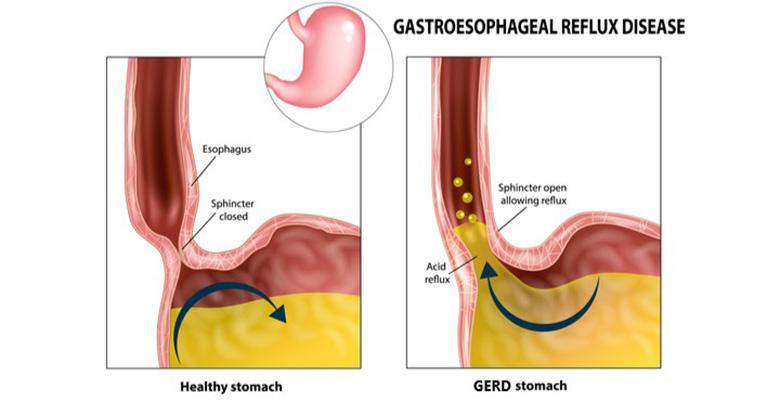GERD Treatment in Tampa, Florida
Gastroesophageal Reflux Disease (GERD) is a chronic digestive condition where stomach acid flows back into the esophagus, causing irritation and discomfort. GERD affects millions of people worldwide and can significantly impact daily life if left untreated. The condition is often confused with acid reflux, but GERD is more severe and persistent. The root cause of GERD typically involves a malfunction of the lower esophageal sphincter (LES), which fails to close properly, allowing acid to escape from the stomach into the esophagus. GERD can be a lifelong condition, but with proper management, symptoms can be controlled, and quality of life can be maintained.
The four stages of GERD range from mild, infrequent symptoms to severe, chronic symptoms with potential complications. Without treatment, GERD can lead to more serious health issues, such as esophageal damage and Barrett’s esophagus.
Symptoms
Symptoms of GERD:
- Heartburn
- Regurgitation
- Chest pain
- Difficulty swallowing
- Chronic cough
- Hoarseness or sore throat
- Asthma
- Disrupted sleep
Severe Symptoms of GERD:
- Intense chest pain
- Persistent cough
- Severe heartburn
- Difficulty swallowing
- Feeling of a lump in the throat
- Back pain, particularly between the shoulder blades
- Signs of esophageal damage, such as bleeding or weight loss
Early Signs of GERD:
- Frequent heartburn
- Acid regurgitation
- Mild chest discomfort

Causes and Risk Factors
Common Causes of GERD:
- Malfunction of the lower esophageal sphincter (LES)
- Obesity
- Hiatal hernia
- Pregnancy
- Smoking
- Certain medications
- Dietary choices, such as fatty or fried foods, coffee, and alcohol
Can GERD Heal on Its Own? While some mild cases of GERD can improve with lifestyle changes, persistent GERD typically requires medical treatment to manage symptoms and prevent complications.
Is it Okay to Live with GERD? Living with untreated GERD is not recommended as it can lead to chronic discomfort, esophageal damage, and increased risk of complications such as Barrett’s esophagus. Seeking treatment is essential for managing symptoms and improving quality of life.
Treatment Options For GERD
Dietary Changes
Adopting a GERD-friendly diet involves avoiding trigger foods that can worsen symptoms, such as fatty or fried foods, coffee, alcohol, and chocolate. Instead, incorporate foods that can help manage symptoms, like lean proteins, vegetables, and non-citrus fruits.
- Reduces acid reflux and heartburn
- Improves digestion
- Supports overall digestive health
Dietary changes can lead to symptom improvement within a few weeks, but ongoing commitment is necessary.
Medications
Medications for GERD include antacids, H2 blockers, and proton pump inhibitors (PPIs) to reduce stomach acid production and heal the esophagus. It is essential to consult a healthcare provider for the right prescription tailored to your needs.
- Alleviates symptoms quickly
- Helps heal the esophagus
- Prevents complications
Improvement can be seen within days to weeks, depending on the medication and individual response.
Fundoplication
This surgery involves wrapping the top of the stomach around the lower esophagus to reinforce the LES and prevent acid reflux.
- Provides long-term relief from GERD symptoms
- Reduces acid reflux significantly
- Improves quality of life
Patients typically recover within a few weeks, with restrictions on heavy lifting and strenuous activity.
LINX Device
A small ring of magnetic beads is placed around the LES to strengthen it and prevent acid reflux.
- Minimally invasive procedure
- Effective for patients with severe GERD
- Quick recovery time
Recovery is generally fast, with most patients resuming normal activities within a few weeks.
Common Misconceptions about GERD
GERD is not just a psychological issue; it involves physical changes in the body that require proper medical attention. Unlike what some believe, GERD does not increase the risk of colorectal cancer. Proper management and treatment are necessary for a normal, healthy life.
Special Considerations
For pregnant women, managing GERD requires close cooperation with healthcare providers. Hormonal changes during pregnancy can affect the condition, and gentle treatments like dietary adjustments and stress management are recommended. Consulting with a healthcare provider before using any treatments ensures safety for both mother and baby.
Frequently Asked Questions (FAQs)
Both conditions can be uncomfortable, but GERD (gastroesophageal reflux disease) often causes more persistent and potentially severe symptoms like heartburn and acid reflux. Gastritis involves inflammation of the stomach lining, which can also be painful but is typically less chronic than GERD.
GERD can be managed with lifestyle changes, medications, and, in some cases, surgery. While symptoms can improve significantly, GERD often requires ongoing management to prevent recurrence.
GERD can contribute to flatulence due to the swallowing of air (aerophagia) and poor digestion. However, excessive gas is more commonly related to diet and other digestive conditions.
An unhealthy fart may smell particularly foul due to high levels of sulfur-containing compounds. Persistent bad-smelling gas could indicate digestive issues or food intolerances.
Farting before pooping is common as gas is naturally expelled from the digestive tract when the bowel movements stimulate the intestines.
A wet fart is often referred to as a “shart.” It occurs when a small amount of liquid stool is expelled along with gas.
Passing gas without pooping can happen due to trapped gas in the digestive system, often from swallowed air, certain foods, or digestive slowdowns.
To release gas from the stomach, try gently massaging your abdomen, drinking warm water, walking, or using over-the-counter anti-gas medications like simethicone.
Submit your Suggestion





